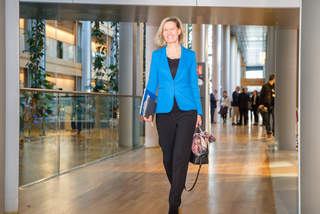
Prof. Dr. Angelika Niebler, Member of the European Parliament © Angelika Niebler
Diversification is also a task for industry
What motivates you for your work?
Europe has always been a matter close to my heart. I am deeply convinced that we need a strong European Union that is globally perceived as a reliable partner. The European Parliament, of which I have been a member for many years, plays a central role in this. Europe is our present and our future. Only if we act together will we be able to overcome future challenges and crises. Russias brutal war against Ukraine clearly shows us how important cohesion in the European Union is and how much we need to work towards taking more responsibility for our own security in Europe. We also need a single European energy market to secure energy supplies and get energy prices under control. The Covid pandemic has also shown the importance of joint action, for example in the joint procurement of vaccines. The single market and the common currency are central to Germany as an industrial location. Being able to contribute daily to the building of this common European house motivates me immensely, just as the many debates and discussions on finding the right solutions with colleagues from the other 26 Member States inspire and enrich me every day.
How do you contribute to strengthening Europe through your work?
The European Parliament is the democratic heart of Europe. Together with the Member States, MEPs are legislators, decide on the budget and control the Commission. Countless individual issues are on our agenda every day: from the abolition of roaming charges, rules on more product safety and better consumer protection to the harmonisation of legislation in the internal market, rules for fair play on the internet, the targets to become climate neutral in the EU by 2050, or the conclusion of trade agreements and the strengthening of our financial market - the Parliament decides on every single legislative proposal. The benchmark for my political work is always the social market economy. It is also important to me to bring Europe closer to the citizens of Bavaria through my work on the ground. A few weeks ago, we celebrated the 30th anniversary of the European Single Market. This great success - having built the largest single market in the world - has not been widely reported.
What do you consider to be the top European policy issue facing German industry in the next six months?
The Russian war of aggression on Ukraine has once again clearly shown how dependent we are on energy supplies, raw materials and individual (primary) products. Diversification is the order of the day; this is not only a task for politicians, but for industry in particular. Furthermore, German industry is challenged when it comes to sustainability and digitalisation. The challenges for our companies are enormous: high energy prices, labour shortages, supply chain disruptions. Politically, we must ensure that businesses do not suffer even more from excessive regulation. Our innovative companies need breathing space, not more and more bans. That is why we in the European Parliament have been calling for a moratorium on burdens for businesses for some time. Our industry must remain internationally competitive. This is the only way we can maintain our prosperity in the EU.



